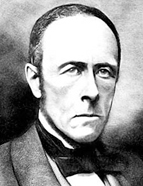

But his major legacy in that field was the Portugaliæ Monumenta Historica [Historical Monuments of Portugal], the many volumes of which were published from 1856 onwards. Under the aegis of the Academia das Ciências, and linked to two long archive expeditions across the Centre and North of the country, such a collective venture absorbed most of his intellectual energy for around two decades (Coelho, “A. Herculano”; Serrão, Herculano e a consciência do Liberalismo, 121-133).
Herculano would combine the complex manner of his anti-Centralist political intervention with his ability to work with historical documents in the three volumes of the book that would come to be known, from its second edition onwards, as História da origem e estabelecimento da Inquisição em Portugal [“History of the Origin and Establishment of the Inquisition in Portugal”]. This work must be read as an extension of the heated controversy initiated in 1850 (Buescu, O Milagre de Ourique, 95-96). It is, after all, a transmutation of the controversy into a long-term inquisitive research effort which does not seek to conceal the traces of the political stance with which it is affiliated. Herculano admitted this himself in the preface to the third edition of História de Portugal (1863), a work he deemed strictly impartial, when stating that “after the book with no political agenda, came another which had one” (História de Portugal, I, 5). That very same difference was clearly evident in the subtitle of the first edition, “historical endeavour” which, when compared with the emphatic claims of the impartiality of História de Portugal, signalled the more precarious condition of an openly politicised and politicising interpretation. (Assis, “A. Herculano entre a imparcialidade e a parcialidade” [“A. Herculano between impartiality and partiality”], 310-316; Macedo, “A tentativa história” [“The historical endeavour”], lxxii-lxxiv; c).
The target audience of Herculano's book on the Inquisition was not the public at large or his political adversaries, but rather those who shared some of his fundamental liberal beliefs. He intended, in his own words, “to strengthen the liberal faith of the field's half-hearted and alert them to the deceptions of the defectors.” (História da Inquisição em Portugal, I, 9-10). He was deeply concerned about a possible coalition of two trends with which he associated serious risks of a political retrocession in the mid-19th century: the ecclesiastical centralism advocated by Pope Pius IX and the parliamentarian neo-centralism followed by the architects of the Regeneration in Portugal. (Macedo, “A tentativa histórica”, xxxv-xxxvi). Both politically and historiographically, his intervention was structured around the choice of a past theme he deemed particularly embarrassing for the contemporary reactionary partisans. Herculano then dived into the first decades of the 16th century to bring to present awareness what had formerly been the worst outcomes of the free deployment of the political principles he sought to combat.
